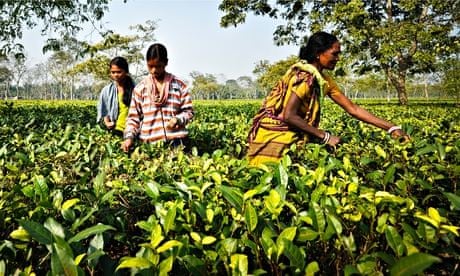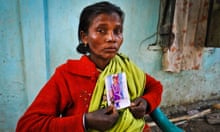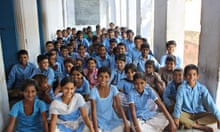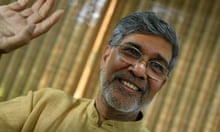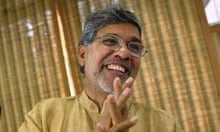A car, speeding through the crowded streets of Delhi. Inside, a phone is ringing. The voice on the line is that of a ghost, a girl who vanished into thin air three years ago.
Somila was 16 when the traffickers lured her from the poverty of her home on the tea plantation in Assam with promises of a better life. Now she is a slave, trapped and terrified, lost in a city of 16 million people.
Crammed into the car are people determined to find her and set her free. They crane to hear her voice on the tinny speaker. Help me, she says. Her owners are threatening to sell her into prostitution in Mumbai. She is afraid she will be lost for ever.
Help me. Find me. There is not a second to lose.
This is the world of modern slavery, a world in which something as apparently innocuous as the price of a cup of tea can drive an ancient trade that many assume has been consigned to history.
Somila was born on the vast Nahorani tea plantation in the northeast Indian state of Assam, owned by a consortium that includes Tata Global Beverages – which uses leaves from the estate in its best-selling Tetley brand – and the World Bank's investment arm, the International Finance Corporation. While the owners count their fortunes in billions of pounds, the Nahorani tea workers – and every other tea worker in Assam, including all those picking for Tetley and the other big brands – earn a basic wage of just 94 rupees a day (91p). If that seems a small amount, it is. The legal minimum wage for Assam is 169 rupees for an unskilled worker. But tea is big business in India and Assam in particular, and a cartel of owners have persuaded the state that they cannot afford to pay the legal minimum. In doing so, they have created a fertile breeding ground for the 21st century slave trade.
Twelve hundred miles away in Delhi, a booming middle class demands staff to tackle the domestic chores they now consider beneath them. To meet demand, thousands of placement agencies have sprung up to supply girls as maids. They source the girls from places where families cannot afford to keep their children. And this is what makes the tea estates of Assam, with their poverty pay, so very attractive to the traffickers.
Inside the car, the phone is ringing again. It is Somila, frightened and confused. She says she does not know where she is. The tall, well-groomed figure in the front seat turns and speaks urgently to one of the others. "She is frightened of the trafficker," he says. "She is frightened that they will kill her family."
The man's name is Kailash Satyarthi. It is 34 years since he founded the group that is now on Somila's trail, the Bachpan Bachao Andolan (BBA – Save the Childhood Movement). He has lost count of the children he has rescued in the intervening years. "Her world view is so limited that she believes the slave master is the super boss, the centre of power, that he can do anything," he says. "And they have threatened her that if the police come, they will take her and her father to jail. Poor people do not trust the police – they believe the police are for the masters and not the poor people."
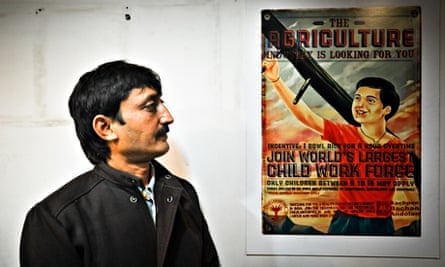
The phone is handed to Ramesh, Somila's father, crouching in the back of the car. He tells her that her mother is sick, that it is urgent, that he needs to take her back home. Still she hesitates. The only clue the team have is that they know the trafficker's office is in the Tagore Gardens district in west Delhi. The car plunges back into the traffic, leading the rest of the rescue convoy west.
Somila Tanti was 16 when a trafficker came calling. She was one of the brighter girls in her class and her father, Ramesh, had scrimped and saved to pay for her to take computer lessons. "My whole life I kept on plucking, doing the plantation work," he says. "But I didn't want that my daughter should do it, so I thought that if she studies well, she can have a decent future. I was very concerned about her future." But the trafficker was persuasive. He filled Somila's head with stories of Delhi and the better life she could have there.
"Two days before my daughter was kidnapped this agent, the trafficker, came and gave her a lot of tempting ideas that if you go with me, you will be happy, things like that. I remember the day, it was a Saturday. She was not behaving normally. She was wearing different clothes, a dress she had made herself. I wondered where she was going, but she often stayed with a friend, so I did not worry about it."
It was only when the girl failed to return the next day that her parents started to panic. "When I enquired with some people they told me that there was a trafficker, he used to come to your home and they had noticed that this man has taken her," says Ramesh. "We cried and cried like anything, we wept and my wife and my mother, all of us kept on crying and we were helpless."
That was three years ago. Since then, there have been a few brief phone calls, promises that Somila will be allowed home, but nothing has come of them. "My heart has been burning, it got broken many a time, but being a man I tried to keep my tears inside," says Ramesh.
The family are not alone. At least 13 other girls are missing from the plantation. Shiboti Tanti's mother, Rajanti, was picking tea when word reached her that people were taking her 12-year-old away. She dropped everything and ran to the road. There were two people there, putting her daughter into a car. "Stop!" she screamed, but they told her not to worry. "We will look after her," they said. That was a year ago.
Laxmi Munda was 12 when she disappeared. The local trafficker, Deepak, had been to the family's home the day before to talk to her parents, Mangoal and Susena, but they did not really understand what was happening. The next day she was gone, along with several other girls from the area.
"She was a trusting person. Maybe he promised her a better job so that's why she believed him and she went with the other girls," says Susena. Deepak lives on the estate, she says. "This is his job, to get girls from here to supply to Delhi."
Susena is on her own in the house. Desperate to get Laxmi back, Mangoal went to Delhi six months ago to try to find her. Susena has not seen him since. Occasionally there has been a call from one or the other, holding out hope of a return, but nothing has come of it. "People say things, but they don't act. My daughter is not here, my husband is not here. I have only my pain: I live with my pain only," she says.
The list goes on. Rekha Munda was taken when she was just 11. No one has seen her since. Sisters Sunita Tanti, 17, and Anita, 13, were picked off by the traffickers two years ago. "If I saw them, I would say they are pimps; they are not men, they are pimps," says their grandfather, Sadan Tanti, bitterly.
Inside the car, the phone is ringing again. This time Somila has the name of an area, but it matches nothing in the city. A neighbour is trying to help her. The address is BC9GF, she says. Satyarthi scribbles it down, and stares at it. It takes an iPhone and Google Maps to crack it. Nearby is an area called Mianwali Nagar; could that be the name she's been trying to pronounce? Still, BC9GF. What does it mean?
"Building complex 9?" suggests Satyarthi. No, look, here is an AB road. Could there be… yes… there it is, BC Road. She's at 9BC Road, Ground Floor. That's it. It is barely a mile away. The car turns north and stops outside the nearest police station. A couple of officers climb into the vehicles behind.
The turning is barely a couple of hundred yards further down the road. It is a typical middle-class Delhi street. The salmon-pink house, three storeys high with ornate balustrades, sits behind a large metal gate. A woman on the first floor is hanging out clothes on the balcony.
Out of the cars, hammering on the gate, then into the house. The owner stands in the middle of the room, looking bewildered. Does she have a maid? Yes. Then call her. Time stops. And then there she is, a small figure, emerging from the darkness of the back room through silver curtains draped across an archway, taking off her apron, a smile spreading across her face.
"Are you Somila Tanti from Sonitpur?"
She nods.
"Then you are free."
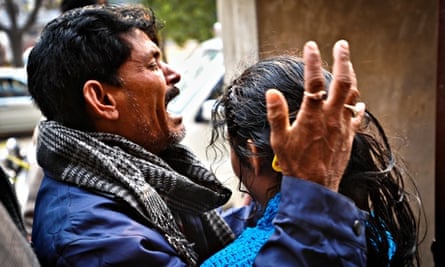
Somila takes off her apron and steps forward. She is led outside to where her father is waiting.
He throws his arms around her, wails his joy. There is what seems like an eternity of tears, the pair clinging together. He is so overcome it seems he might collapse. Satyarthi forces him to take water from a plastic bottle and he gulps at it hungrily, head tilted back, rivulets running down his face.
A little while later, everyone is back inside the house. The police have called Sanjay, the trafficker, and told him to come. He arrives on a motorbike, a worried man. They sit him on the sofa, take away his phone and his bike keys and start to ask him questions. The couple who bought Somila from him for £250 look on, baffled, unable to understand what they have done wrong. They paid him 4,000 rupees a month in wages for Somila, they say, though she never saw a penny.
Sanjay is led away. Later he will confess to taking 18 girls and will be charged with trafficking and abduction. He will not be granted bail.
On the pavement outside the house, Shomna Tanti watches him go. He is happy for his friend, but there is no mistaking the pain in his eyes. There is no word on Shiboti.
Somila sits on the hard concrete step of the police station, waiting to make her statement. "I had a deep feeling in my heart that one day my father would come to search for me. But I could not expect this thing today," she says. The traffickers had tricked her into leaving, she says. "I was tempted with a decent job and I was told that since I am a little bit educated I will find a good job in an office or at a shop, so come with us and you will earn good money and we were poor so I thought it would be good."
Instead, she found herself unable to escape. Her first owner was a doctor, who did not mistreat her, but would not let her go home. After 11 months, she was moved on to a different place, before being moved again. "I was abused badly at that second place. That man was very bad: he used to touch me in my private parts and try to rape me. I was very angry, but I had nowhere to go and I did not want to stay there," she says.
Nowhere did she have a room of her own. She describes sleeping on the floor, cold in the winter, with no covers. "I cried and I missed my parents. If I was at home it would never happen with me that I was shivering in the cold."
She wants to return to her studies, to be a nurse, she says. And she wants the people who took her to be punished.
In the past two years, the BBA has rescued 2,600 children, but two of their members have been killed and most of the others have tales to tell of beatings. "In my own case I have my broken leg and my broken head and my broken back and my broken shoulder," says Satyarthi. He shrugs. "These people are like the mafia, they are very, very powerful." Yet he is determined to press on. "I cannot tolerate the loss of freedom of any single child in my own country," he says.
More than 100,000 young people are believed to be in domestic slavery in Delhi. "I don't think these people who engage them as domestic slaves ever think of it. They have a different mindset: they think they were born to take work from the poor people, and sometimes the poor people think they were born to work for them."
But he is angry, too, with the tea companies who pay so little that the girls are vulnerable to the slave traders. "The owners of these international tea estates don't care for these people. They don't pay them minimum wages. Forget about the decent wages: they don't even pay survival wages." The companies make their profits, he says, and the poor are left hoping that the traffickers' promises of a better life somewhere else are true. But they never are. "The reality is slavery, the reality is abuse, the reality is sexual exploitation, the reality is endless slavery."
A little after 9am, the cars move out for a raid on a placement agency in the Shivaji Park area of Delhi. They pull up outside a three-storey building in a busy, down-at-heel street. On the roof terrace a group of girls start to run in panic as the police and rescuers enter the building.
BBA officer Rakesh Senger leads the way, with the parents following behind, hoping to find their daughters. Rakesh is shouting for Ranjit, the trafficker, but he is not there. They find some girls in an office with mattresses on the floor and locked filing cabinets containing false documents. More documents are found inside a bed, with books and false papers.
In the south of the city, another team has gone after Laxmi Munda, whose mother Susena is alone in Assam since her father Mangoal went looking for her. The trafficker, Jacob, says he has no idea where she has gone. There are several men in the room. "I am Mangoal, from Sonitpur, here seeking my daughter," says one. He had tracked Laxmi down to the agency, only to be imprisoned himself. "He kept me here for the last two months and didn't give me any money or my daughter. Jacob took all my money so I could not leave."
Fifteen days earlier, he had finally been reunited with Laxmi. He mimes hugging her. But he does not know where she is now. She is lost again.
The Nahorani estate is owned by Amalgamated Plantations, a joint venture between Tata Global Beverages and the International Finance Corporation (IFC), the investment arm of the World Bank. Tata is worth $60bn and Tetley – which it bought for £271m in 2000 – is its best-selling brand in the UK. Tata holds a 49.66% stake in Amalgamated Plantations; the IFC, which manages billions of pounds of funds and is committed to eradicating extreme poverty, holds a 15.6% stake. Yet Amalgamated, in common with other tea companies in Assam, is permitted by the state to pay workers just 94 rupees a day – topping it up to the legal limit, they claim, with benefits in kind. The average tea worker earns 2p for every box of 80 tea bags sold for £2 in UK supermarkets.
Six months ago, when the Observer first exposed the trade in slaves from the tea estates, the world's major producers pledged to act. Certifying bodies, including the Ethical Tea Partnership, expressed their sympathy for the victims, and claim never to have encountered trafficking on their members' estates, but are working with various groups to try to prevent it. Since then, the only change has been a 5-rupee-a-day wage rise – an annual rise which had already been agreed. The poverty in which the workers live remains. Last year the IFC's own watchdog, the Office of the Compliance Advisor Ombudsman, launched an investigation into the Amalgamated project following complaints from three local NGOs.
A week after Somila is freed, the BBA team springs Shiboti from the house where she is working. They arrive at night and there is a protracted argument with her owner before the girl is handed over.
As she bundles up her few possessions, she shows them where she sleeps, on the floor in a stairwell. She had been tempted by the idea of earning more money, she says. She was sent first to Punjab, then Delhi. The agency kept her wages and refused to let her go home. "My employer's wife used to taunt me by saying: 'I've bought you for 30,000 rupees, so do as I say,'" she says. "She used to beat me for every small mistake I made or even without any mistake. I used to work for longer hours and she would make me wash the whole premises every day. She always used to criticise my family and even threatened me that she'll send me to jail by making false complaints." She glances at her relieved father, Shomna. "I still can't believe that I am with my family and have escaped from that hell."
Three days later, Rekha Munda is freed. It is the final raid. In total 20 girls and boys are free as a result of the Nahorani investigation. Yet there are tens of thousands like them unable to escape. Between 2008 and 2012, 452,679 cases of child trafficking for domestic labour were reported in India. Just 3,394 – 0.6% – of those reports led to convictions. The tea companies still insist that they cannot pay another rupee more. In the last quarter Tata Global Beverages posted profits of £11m.
Laxmi Munda and Sunita and Anita Tanti are still out there, lost somewhere in this vast megacity, living proof that slavery thrives in the second decade of the 21st century. For thousands like them, the price of a cup of tea has proved to be very high indeed.
To see Gethin Chamberlain's extraordinary film of the reunion between a slave girl and her father, go to theguardian.com/india
